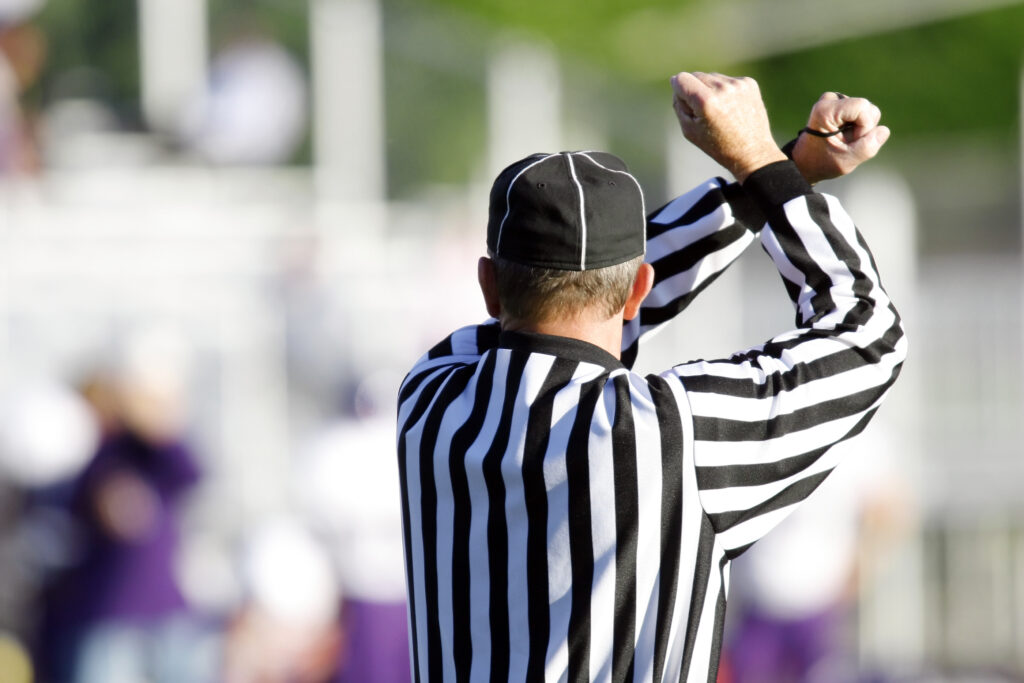Games have rules. Players follow the rules to win. And winning is what everyone wants.
This truth brings us to the role of the referee in our Super Bowl parenting lesson.
The referee is the primary official responsible for overseeing the game. They ensure the game is both safe and fair. To do this, they must watch every play. Noticing everyone and everything they do. Being close enough to observe the game but not too close to impede play. Making quick decisions about where players should or shouldn’t be. Who did or didn’t do what. And what did or didn’t happen. And then ruling on it. Throwing a flag when misconduct or violations occur. And inflicting painful penalties to discipline players and teams for their misbehavior.
Yes, the referee enforces the laws of the game. Acting as the final authority on all matters of fact and opinion. Their role is both judge and jury. They analyze. Compare to defined standards. Point out missteps. And discipline accordingly. This gives them the ultimate authority in the game. Not only are they in charge, but they control how the game unfolds. There’s little doubt they relish being critiquer-in-chief and head compliance officer. It’s a role filled with power because they determine the game’s outcome.
We know players want to win the game. But what about the referee? They don’t win. So, what do they want? The stakes for them are entirely different. Who wins and loses is irrelevant for a referee – both personally and professionally. What does matter is that they do their job. They ensure rules are followed, and consequences are inflicted when they’re not. Period. That’s it. And herein lies the problem for the player with the ref. Their goals are compatible but also highly contradictory. Making their goals misaligned: the player wants to win, but the referee doesn’t care who wins. This ultimately puts them in opposition to one another.
It’s the same for you as a mom. Being a referee feels consequential. Powerful even. Because you have the authority and control, you’re in charge. You ensure the rules are followed. It’s the ultimate responsibility. You might even believe this is your most important job. Because if you don’t do it, who will? And so you do it with gusto, and you believe in it. As if being the judge and jury is THE way. Like you’ll move your teen toward their goal by judging their behavior and dishing out penalties when it doesn’t meet the standard. I know, I know. You think they’ll “see the light” when you point out their flaws and take away their privileges. They’ll change and see the error of their ways. But THIS isn’t the way. And it doesn’t work. Because no one, including your teen, likes the referee. No one enjoys having flags thrown, their flaws pointed out, and penalties imposed. In fact, these actions create engulfing animosity and distrust between you and your teen. They’re condescending. Feel hypercritical. And leave your teen wondering whose team you’re on. And trust me, I know you’re hoping for a life-changing moment in which your teen looks at you fondly and says, “Thank you, Mom, for pointing out what I was doing wrong. I couldn’t see it, but now I do. I’m gonna change and never do that again.”
SAID NO TEEN EVER.
So, give up now because it’s NOT going to happen. Not a referee mom on the planet has ever heard those words. 😉 No player thanks the referee for their illuminating and life-changing application of rules and consequences. It just doesn’t happen.
And yes, I hear you. “But my teen did something wrong. They broke the rules, and they needed consequences. Are you telling me I should just let it go?” No, that’s not what I’m telling you. What I’m telling you is the role of referee doesn’t work. The critical, critiquing, penalty-inflicting “you’re gonna pay for your wrongs” energy doesn’t work. It’s the wrong vibe. And teens hate it. It pushes them to rebel. To be defiant. And sometimes, do precisely what you want them NOT to do. And we don’t want that.
Don’t worry. There is a role that works – that has the right vibe to alter behavior positively and ensure rules are followed, but it’s not the referee.
Did you notice the stark contrast between this week’s rule-enforcing referee and last week’s always-positive cheerleader? The referee focuses on the importance of rules, obedience, and discipline. While the cheerleader glosses over all that with a layer of superficial cheers and placating one-liners. Each is trying to create change but in opposite ways. Their tactics and behaviors fall at completely different ends of the spectrum. Neither the referee’s strict penalties nor the cheerleader’s thunderous applause create any real, lasting change for the player. (Read that twice, please.)
And still, the majority of moms flip-flop from cheerleader to referee. Back and forth they go. Choosing to be super kind and tolerant one day. And controlling and ultra-punitive the next. This never-ending tug-of-war creates a divisive challenge no teen wants or knows how to handle. So they shut down. And shut you out. Hiding inside themselves. Where it’s safe. Because the never-ending mystery of inconsistency and wondering who you’ll be each day is WAY harder than facing any role you play consistently. So, don’t flip-flop. Don’t go from one extreme to the other. Don’t wonder if you’re doing it wrong because if you’re flip-flopping, you ARE doing it wrong. No teen responds to extremes – at least not in the way you’re hoping for. 😉 Teens need consistency. And they need you in a role that’s not the referee or the cheerleader. And yes, we are getting closer to the coveted role. But first, you must know what doesn’t work, so what does work is crystal clear. Obvious even.
Football analogy lesson #2: Stop being the referee.
Football analogy lesson #3: Do not flip-flop between referee and cheerleader.
If you think it’s your job to be your teen’s referee, one thing is certain. You’ll suck the life from your teen and the levity from your home. Making them feel like it’s more of a prison than a safe place to land. And they’ll think you’re the opposition. But they don’t want it to be that way. They want you to be different. And they want you to play a different role. They want to learn from you. Respect you. And grow with you. And soon, you’re going to know how to do precisely that. And your teen is going to love it.
If you can take these steps on your own, make it happen, and if you’re willing, please share your experiences with me. But if you can’t, I can help. Click CONTACT at the bottom of the page, and we’ll chat.




